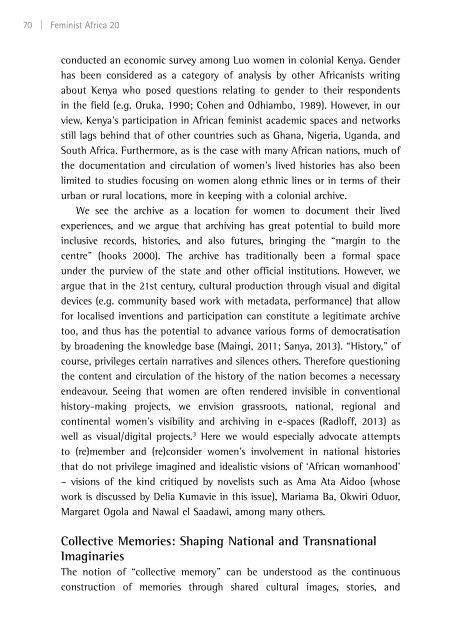You also want an ePaper? Increase the reach of your titles
YUMPU automatically turns print PDFs into web optimized ePapers that Google loves.
70 | Feminist Africa 20<br />
conducted an economic survey among Luo women in colonial Kenya. Gender<br />
has been considered as a category of analysis by other Africanists writing<br />
about Kenya who posed questions relating to gender to their respondents<br />
in the field (e.g. Oruka, 1990; Cohen <strong>and</strong> Odhiambo, 1989). However, in our<br />
view, Kenya’s participation in African feminist academic spaces <strong>and</strong> networks<br />
still lags behind that of other countries such as Ghana, Nigeria, Ug<strong>and</strong>a, <strong>and</strong><br />
South Africa. Furthermore, as is the case with many African nations, much of<br />
the documentation <strong>and</strong> circulation of women’s lived histories has also been<br />
limited to studies focusing on women along ethnic lines or in terms of their<br />
urban or rural locations, more in keeping with a colonial archive.<br />
We see the archive as a location for women to document their lived<br />
experiences, <strong>and</strong> we argue that archiving has great potential to build more<br />
inclusive records, histories, <strong>and</strong> also futures, bringing the “margin to the<br />
centre” (hooks 2000). The archive has traditionally been a formal space<br />
under the purview of the state <strong>and</strong> other official institutions. However, we<br />
argue that in the 21st century, cultural production through visual <strong>and</strong> digital<br />
devices (e.g. community based work with metadata, performance) that allow<br />
for localised inventions <strong>and</strong> participation can constitute a legitimate archive<br />
too, <strong>and</strong> thus has the potential to advance various forms of democratisation<br />
by broadening the knowledge base (Maingi, 2011; Sanya, 2013). “History,” of<br />
course, privileges certain narratives <strong>and</strong> silences others. Therefore questioning<br />
the content <strong>and</strong> circulation of the history of the nation becomes a necessary<br />
endeavour. Seeing that women are often rendered invisible in conventional<br />
history-making projects, we envision grassroots, national, regional <strong>and</strong><br />
continental women’s visibility <strong>and</strong> archiving in e-spaces (Radloff, 2013) as<br />
well as visual/digital projects. 3 Here we would especially advocate attempts<br />
to (re)member <strong>and</strong> (re)consider women’s involvement in national histories<br />
that do not privilege imagined <strong>and</strong> idealistic visions of ‘African womanhood’<br />
– visions of the kind critiqued by novelists such as Ama Ata Aidoo (whose<br />
work is discussed by Delia Kumavie in this issue), Mariama Ba, Okwiri Oduor,<br />
Margaret Ogola <strong>and</strong> Nawal el Saadawi, among many others.<br />
Collective Memories: Shaping National <strong>and</strong> Transnational<br />
Imaginaries<br />
The notion of “collective memory” can be understood as the continuous<br />
construction of memories through shared cultural images, stories, <strong>and</strong>


